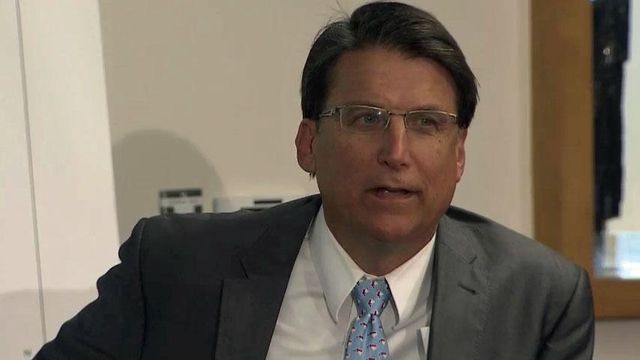McCrory talks offshore drilling after meeting closed to public
Gov. Pat McCrory told a gathering of state and federal officials Thursday it was time to figure out what kind of oil and gas resources might lie off the North Carolina coast.
Posted — UpdatedBut aside from McCrory's comments, the entire invite-only event was off-limits both to the public and environmental groups that say they should have at least had an opportunity to listen.
"This is pretty big," said Randy Sturgill of Oceana, one of the groups that signed the letter. "The decisions being made are going to affect for generations to come what our pristine beaches and Atlantic waters are going to look like. A lot of folks lives and livelihoods are depending on what's going on behind those closed doors in Raleigh today."
Responding to questions Thursday afternoon, Skvarla said closing the meeting was "a collaborative, collective decision made by several federal agencies and DENR." He would not say which federal agencies were involved with the decision.
"There's going to be plenty of time for stakeholder involvement," Skvarla said. "The process will be done right, but we had serious input from our federal partners, and we collectively decided that would be the best format for the meeting."
In a letter responding to environmental groups, DENR Deputy Secretary Donald var der Vaart wrote that the event was kept invitation-only in part because of concerns from one of the federal agencies over potential conflicts of interest.
The Center for Offshore Safety, an oil and gas industry-sponsored group established in the wake of the 2010 Deepwater Horizon oil spill in the Gulf of Mexico, adopts standards for drilling on the Outer Continental Shelf.
State Rep. Pricey Harrison, D-Guilford, who attended the sessions Thursday, said presentations from these groups pushed the benefits of offshore drilling and left out many of the potential problems.
"This is a huge issue for our state, and I think we need more balanced participation," said Harrison, who sits on several environmental committees in the legislature. "It would have been nice to have the pros and cons. All we heard were the pros today."
With the federal government currently preparing a draft of the next offshore drilling plan due out January, Sierra Weaver, senior attorney for the Southern Environmental Law Center, said she's concerned federal officials will make decisions without broad input.
"What we have is state talking to federal government. We have industry talking to federal government," she said. "Yet, people with concerns about the environmental impacts are shut out of the room."
DENR spokesman Drew Elliot reiterated that point Thursday afternoon, saying representatives from the industry groups were "issue experts who were able to contribute to this learning experience."
"The people in this room, we're going to have to be the ones who know about this," Elliot said. "We're more or less starting from zero."
During his comments to the gathering, McCrory said the first step toward offshore drilling would be the use of seismic testing to determine what's contained in the Mid-Atlantic's Outer Continental Shelf. That could begin as early as mid-2015, although it's not likely to begin until later.
"Isn't it time we find out what we have?" McCrory said. "Then, once we find out what we have, we'll find out whether it's worth the return on investment for North Carolina."
He said drilling off the coast has the potential to create jobs and boost infrastructure projects in the state. But that's only possible if the state is able to get a portion of the proceeds in a deal with federal officials.
"It would be difficult to sell this to the North Carolina public unless there is a revenue-sharing plan with the federal government," McCrory said. "If there's no money, none of us win."
Any potential revenue, McCrory said, is likely five to 10 years away.
Moving forward, he said education and communication on the issue would be "80 to 90 percent of our job." Part of that process, he said, means providing similar venues for environmental groups to be heard.
"I will be extremely transparent in these communications, and I think it's going to be extremely important that we meet with all sides of the environmental community, the fishing industry, the infrastructure industry, the oil and gas industry," McCrory said. "We're all going to have to work on this as a team."
Related Topics
• Credits
Copyright 2024 by Capitol Broadcasting Company. All rights reserved. This material may not be published, broadcast, rewritten or redistributed.





